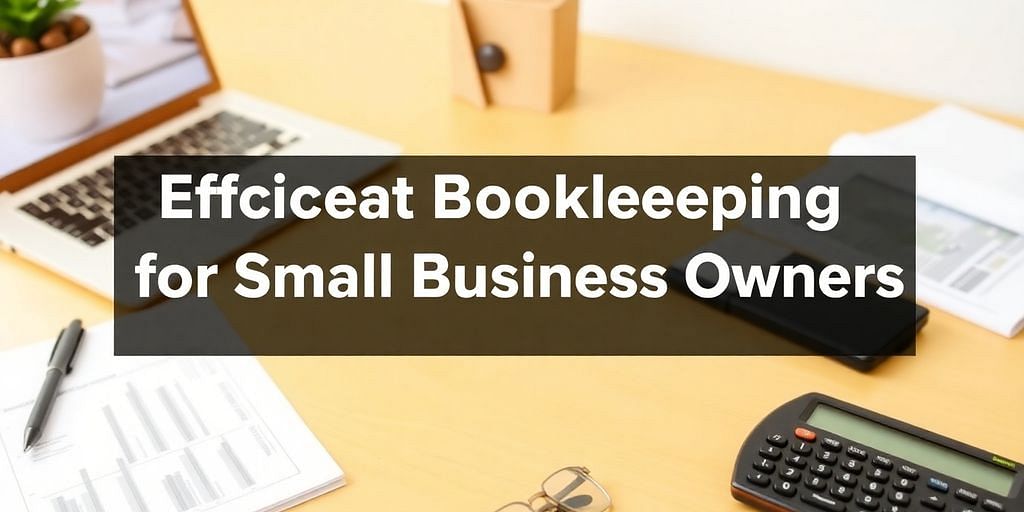
Mastering the Bookkeeping Process: A Comprehensive Guide for Small Business Owners
Back To BlogGetting Started With Your Bookkeeping Process

Bookkeeping can feel like a chore, but trust us, it's super important for your business. Think of it as the foundation upon which you build everything else. We're going to walk you through the basics to get you started on the right foot. It's not as scary as it sounds, we promise!
Why Bookkeeping Matters for Your Business
Why bother with bookkeeping? Well, for starters, it helps you understand where your money is going. It's like having a roadmap for your finances. Without it, you're driving blind! Good bookkeeping also makes tax time way less stressful. Plus, it gives you the insights you need to make smart decisions about your business. For example, are you actually making a profit on that new product line? Bookkeeping will tell you.
- Track your income and expenses accurately.
- Make informed business decisions.
- Prepare for tax season with ease.
Bookkeeping isn't just about crunching numbers; it's about understanding the story your numbers are telling. It's about knowing what's working, what's not, and where you can improve. It's the key to sustainable growth and financial stability.
Common Bookkeeping Mistakes to Avoid
Okay, so now you know why bookkeeping is important. Let's talk about some common pitfalls to avoid. One of the biggest mistakes is mixing personal and business finances. Keep those separate! Another big one is not keeping up with your records. Don't let those receipts pile up! And finally, don't be afraid to ask for help. bookkeeping skills are not innate, and there are plenty of resources available to you.
- Mixing personal and business expenses.
- Neglecting to reconcile bank statements regularly.
- Failing to back up your financial data.
Streamlining Your Bookkeeping Process

Bookkeeping can feel like a chore, but it doesn't have to be! With the right strategies, we can make the process smoother and more efficient. Streamlining not only saves us time but also reduces the risk of errors and provides a clearer view of our business's financial health. Let's explore some ways to optimize our bookkeeping practices.
Tips for Organizing Your Financial Records
Keeping our financial records organized is essential for efficient bookkeeping. Here are some tips to help us stay on top of things:
- Establish a System: Whether it's digital or physical, having a consistent system for storing receipts, invoices, and bank statements is key. Consider using folders, labels, and naming conventions to easily locate documents.
- Go Digital: Scanning and storing documents electronically can save space and make it easier to search for specific items. Cloud storage solutions offer accessibility from anywhere and provide backup in case of data loss.
- Regularly Update: Set aside time each week or month to update our records. This prevents backlogs and ensures that our financial information is always current.
Maintaining organized financial records is not just about compliance; it's about empowering ourselves with the information we need to make informed business decisions.
How to Choose the Right Bookkeeping Tools
Selecting the right bookkeeping tools can significantly impact our efficiency and accuracy. There are many options available, so it's important to choose tools that fit our specific needs and budget. When choosing the right bookkeeping system, consider these points:
- Accounting Software: Programs like QuickBooks or Xero can automate many bookkeeping tasks, such as invoicing, expense tracking, and financial reporting. Look for software that integrates with our other business systems.
- Spreadsheet Software: For smaller businesses with simpler needs, spreadsheet software like Microsoft Excel or Google Sheets can be a cost-effective option. We can create custom templates for tracking income, expenses, and other financial data.
- Receipt Scanning Apps: Apps like Expensify or Shoeboxed can help us capture and organize receipts on the go. These apps often integrate with accounting software, making it easy to import expense data.
Here's a simple comparison of bookkeeping tools:
Mastering Your Bookkeeping Skills
Okay, so we've covered the basics and how to keep things organized. Now, let's get into making sure we actually understand what our books are telling us. It's not just about entering numbers; it's about using that data to make smart choices for our business. Let's get started!
Understanding Financial Statements
Financial statements are like the report cards for our business. They give us a snapshot of how we're doing, where we're strong, and where we might need to improve. Learning to read them is key to making informed decisions. There are three main ones we need to know about:
- Income Statement: This shows our revenue, expenses, and profit (or loss) over a specific period. It helps us see if we're making money and where our costs are coming from.
- Balance Sheet: This gives us a picture of what our business owns (assets), what it owes (liabilities), and our equity at a specific point in time. It's like a financial snapshot of our company's worth.
- Cash Flow Statement: This tracks the movement of cash in and out of our business. It's super important for understanding if we have enough cash to pay our bills and invest in growth. Understanding financial statements is a game changer.
Think of these statements as a way to tell our business's story. They provide insights into our performance, financial position, and cash flow, helping us make better decisions and plan for the future.
The Importance of Regular Reconciliation
Reconciliation is basically making sure our records match up with what the bank says. It might sound tedious, but it's super important for catching errors and preventing fraud. We need to reconcile our bank statements, credit card statements, and any other financial accounts regularly.
Here's why it matters:
- Catching Errors: Reconciliation helps us find mistakes in our bookkeeping, like typos or missed transactions.
- Preventing Fraud: By comparing our records to the bank's, we can spot any unauthorized transactions or suspicious activity.
- Ensuring Accuracy: Reconciliation ensures that our financial statements are accurate and reliable. This is crucial for making informed decisions and getting a clear picture of our business's financial health. Regular bank reconciliation is a must.
Getting good at bookkeeping is super important for anyone who wants to keep their finances in check. It helps you track your money, plan for the future, and avoid surprises. If you want to learn more about improving your bookkeeping skills, check out our website for helpful tips and resources!
Frequently Asked Questions
Why is bookkeeping important for small businesses?
Bookkeeping helps small businesses keep track of their money. It shows how much money is coming in and going out. This way, owners can make better choices about spending and saving.
What are some common mistakes in bookkeeping?
Some common mistakes include not recording transactions on time, mixing personal and business expenses, and not keeping receipts. These mistakes can lead to confusion and problems with money management.
How can I simplify my bookkeeping process?
You can simplify bookkeeping by using software that helps organize your finances. Keeping your records tidy and updating them regularly can also make things easier.
